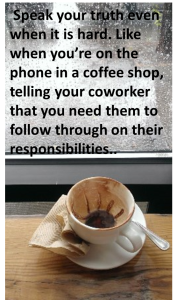Tag: integrity
Why is it so hard to admit our privilege and biases?
Why is it so hard to admit our privilege and biases?
Nobody enjoys being called out for doing or saying something problematic. But in the absence of having wrong behavior brought to our attention, why is it so difficult to consider the ways we’ve received advantages or participated in systems that limit opportunities for others?
I recently read several great articles on these topics, and what they all point out in different ways is that at the root of the issue is fear.
Chris Boeskool published a 2016 Huffpost article, “When You’re Accustomed to Privilege, Equality Feels Like Oppression” that sums up the fear of losing what we’re accustomed to.
On the flip side, what is there to gain by admitting advantages – or lack of disadvantages – that we’ve experienced in our jobs, in our access to housing, and in our daily activities like shopping or exercising?
We might gain a new perspective and empathy for the ways that people can have different experiences than us. It might lead us to examine the way we treat coworkers, customers, or people we pass in the grocery store. Maybe, even if we think we’re already doing fine, it will lead us to do better.
“Do the best you can until you know better. Then when you know better, do better.” – Maya Angelou
Speaking our truth at work
 On the surface, it seems like being honest at work should be the default. I mean…nobody wants to work with liars. Or think of themselves as liars! But people lie all the time at work, for many reasons.
On the surface, it seems like being honest at work should be the default. I mean…nobody wants to work with liars. Or think of themselves as liars! But people lie all the time at work, for many reasons.
At the top of the list is job survival. It is no secret that many managers want to hear that their strategy is intelligent, their plans make sense, the business is generating a positive return on investment, the employees are happy and think their bosses are smart and nice…and on and on, whether it is true or not. Even the managers that profess to want to hear the truth usually don’t, unless you can package the message in a way that puts any blame on someone else and keeps their egos intact.
Then there are the lies that make spending time with coworkers easier. He says, “Your presentation was great” and thinks to himself, “not so much. She says, “I think you’ll do fine in the annual review” when she has heard that the leadership team thinks that you make too many mistakes. He says, “No problem” to the coworker that missed his deadline, when really he is burning up with anger and resentment.
People also lie at work because telling the truth can be uncomfortable for everyone involved. A few days ago I was in a coffee shop and overheard a woman talking on the phone to someone who was either a peer or a staff person she oversees. She said something like, “I’m frustrated because when I’ve asked when you will deliver the report, you tell me you don’t know because you’re too busy.” Her tone of voice sounded exasperated but polite, and her volume was low. She continued to say, “I had to do a lot of extra work because I didn’t have the information I needed in your report. Will you set my expectation for when I will receive it?”
As I’m listening to her, I’m thinking “Good job! You’re expressing yourself honestly and asking for what you need, and you’re doing it in a respectful way.”
Then it got sad and ugly.
But not because she became angry or disrespectful.
It got sad and ugly because she started apologizing.
Apparently the person on the other end of the phone did not receive the message well. The coffee shop woman started saying “I’m sorry. I don’t mean to be rude.” And then spent the next ten minutes pacifying the person she was speaking with. When they finally hung up, I’m not sure she ever got an answer as to when the report was going to be delivered!
Boo.
She wasn’t being rude. She could have been a case study for how to communicate a difficult message to people at work until she backed down as soon as the other person got defensive.
It is often challenging to say the truth at work, especially when you’re pointing out a mistake or asking for something to change. But if you don’t say what you need, you are never going to get your damned report!
Let’s take a moment to reflect on what happens when we deny our truth:
- We make our authentic selves smaller
- We demean the part of ourselves that wants to live with integrity
- We reinforce the habit of denying our truth in order to make other people and ourselves more comfortable
It doesn’t have to be this way. I’ve been working on being truer to myself for several years, and as with anything, it gets easier with practice.
It also feels really good to think back on tough conversations and be proud of myself for communicating honestly instead of holding back out of fear or because I was worried I wouldn’t say exactly the right words. I reminded a friend who was planning to have a conversation with a woman who had disappointed her that “you can tell the truth without being an asshole!”
If you want to speak your truth more often, you might be interested in this: Martha Beck recently emailed a newsletter called “Speak Your Truth. No Matter What.” to promote her upcoming telecourse called The Integrity Cleanse.
This is not one of those times when I get a commission for referring people to products or services. I just love Martha Beck and credit her books and courses with helping me create a better life for myself. I would be thrilled if you also found value in her wisdom. Truth!


Recent Comments